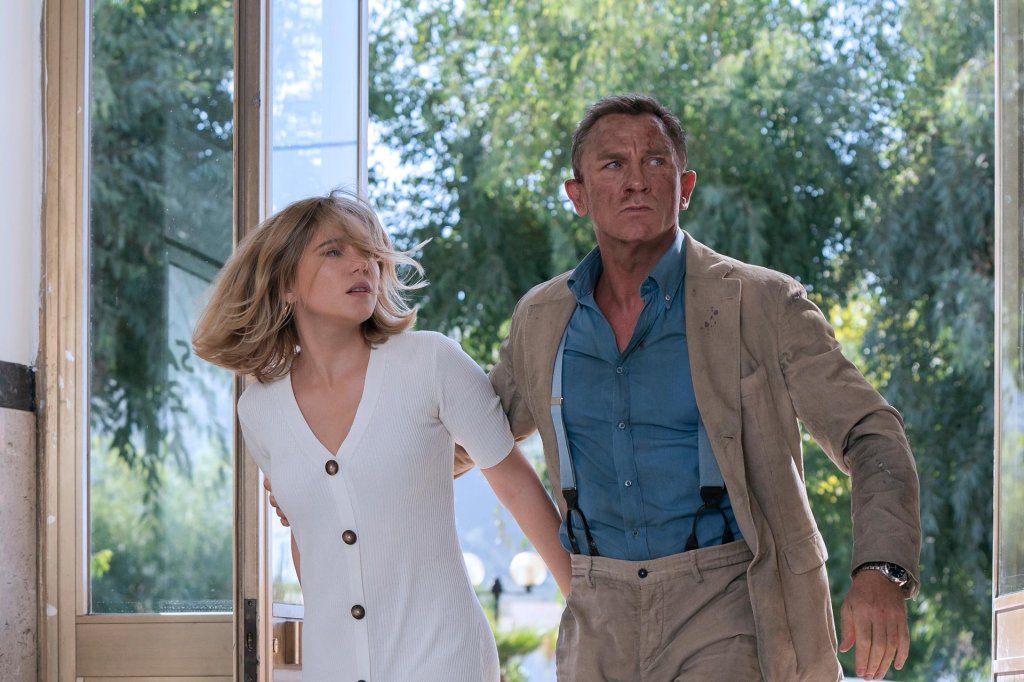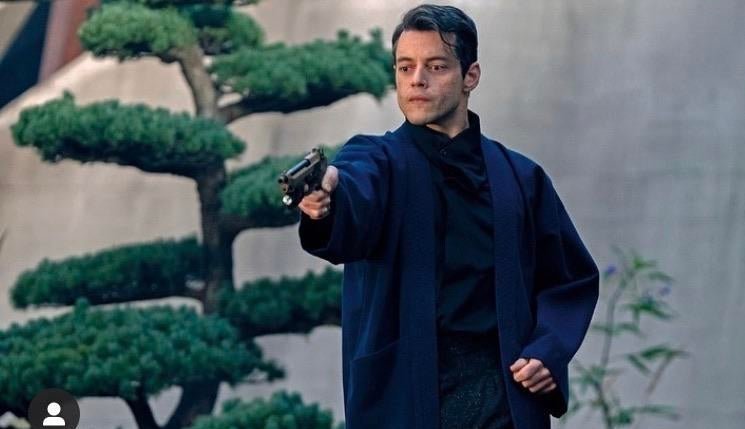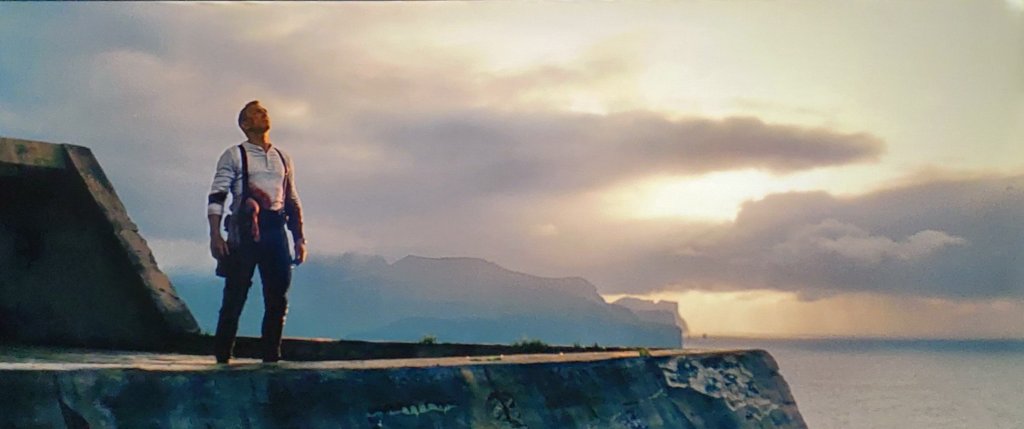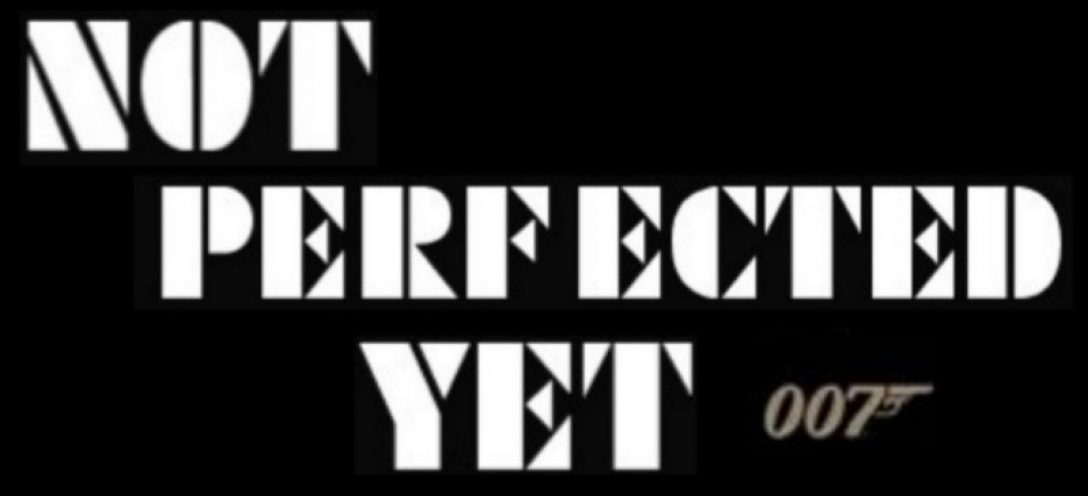This article contains Spoilers for No Time To Die.
As the worldwide release of No Time To Die continues to reach completion, there is a growing division amongst audience opinions on the film. Although currently holding an 84% fresh rating from critics on Rotten Tomatoes, there is a significant vocal presence on social media condemning the film. Much of this criticism has various reasoning; everything from those who do not care for Daniel Craig as James Bond to the plot holes and weaker supporting characters in the script. One argument in particular that has been raised is whether or not No Time To Die is a faithful representation of Ian Fleming’s character of James Bond. Before the reboot in Casino Royale, the cinematic Bond worked on a very set formula, leaning heavily on recurring iconography of gadgets, cars, women and villains, as well as the cliched motifs of the tuxedo, vodka martini and all. Through the Craig era, Bond has been portrayed as more vicious and vulnerable, which became a staple of post 9/11 action heroes, such as Jack Bauer of 24, Bryan Mills in Taken, and Jason Bourne from the Bourne franchise. Although not in keeping with the near invulnerability of James Bond previously, such as during the Roger Moore era, this is similar to Fleming’s writing, which often physically and mentally tortured Bond and was labelled sadistic by critics for it. This idea of torturinf Bond has tied all previous Craig films together, as retroactive continuity has all of his torture and pain orchestrated by Blofeld. After Casino Royale, nothing in the Craig films was directly lifted from the Fleming’s novels, save for the revival of SPECTRE, which took a very different direction. Now with the 25th Bond film here, with the promise in the marketing to “Change everything”, it may be possible that moving away from the representation of the cinematic Bond has led to Craig’s Bond not only being faithful to Ian Fleming’s writing but No Time To Die may also be the closest adaptation we will ever see of one of his most unique and celebrated novels, You Only Live Twice.
Published in 1964, You Only Live Twice explores the fallout left by the murder of Tracy at the end of the previous novel On Her Majesty’s Secret Service. Depressed and broken, James Bond struggles to continue on as an agent, constantly making dangerous mistakes and failing assignments. Sent by M to Japan on a basic diplomatic mission, Bond befriends the head of the Japanese Secret Service, Tiger Tanaka, whose wisdom helps Bond through his grief. However, when Bond discovers that Blofeld is living in Japan under the name of Shatterhand, he becomes solely driven by the opportunity for revenge and embarks on a suicide mission to storm Blofeld’s castle on tge Japanese coast, which is surrounded by a garden filled with lethal plant life. The 1967 film adaptation did away with almost all of this, keeping the setting of Japan and a handful of characters, but instead having Blofeld stealing spacecrafts in an attempt to provoke a World War, whilst Bond fakes his death in order to go undercover and track Blofeld down. This would be the first time that the film adaptation would deviate heavily from the novel, and the two bear very little similarity to each other.

Fleming’s novel and No Time To Die share the common themes of how Bond deals with loss, becomes disassociated with his work and then finds the drive to get back into the game. A key difference between the two is the love interest, as literary Bond marries Tracy di Vincenzo and Craig’s Bond falls in love with Madeline Swann and drives off with her at the end of Spectre. When it was announced that Léa Seydoux was returning for No Time To Die, there was much fan speculation that Madeline would be killed off in the opening sequence and drive Bond to come back on a mission of revenge, just as he dedicates himself to killing Blofeld in You Only Live Twice. This was not the case however, but instead Bond is tricked into believing she has betrayed him to SPECTRE and he abandons her. We have seen Bond react nonchalantly to lovers he fails to save in the past; Solange, Fields and Severine are all women whose deaths provoke almost no emotion from Bond. It is betrayal that affects Craig’s Bond, just as his trauma from Vesper’s betrayal is still deeply rooted in him. Whereas the literary Bond mourns the loss of Tracy and the life he had chosen, Craig’s Bond mourns the loss of the life that could have been, and was just within his grasp.
After the loss, both versions of Bond retreat. Literary Bond drinks his way through shock, whilst his value as an agent deteriorates and Craig’s Bond isolates himself in Jamaica and appears to have no trustworthy ties to anyone anymore. Incidentally, Fleming mentions in You Only Live Twice that Bond had spent a month in Jamaica after Tracy’s death and that it had been “hell” with no further elaboration. Although Craig’s Bond appears to be living life in paradise, there are clear signs that he is still ignoring his trauma. It is pointed out by Nomi that he has created a bubble for himself to live in, in denial of the world around him. The villa is so isolated from civilization that Bond leaves all the doors and windows open, as if he is so convinced that he is alone that there is no threat anymore. We also see Bond casually drinking a lot, with a large supply of spirits for one man living alone, as well as bottles in different rooms should the need for alcohol be immediate.
When Bond returns from Jamaica and is able to confront the imprisoned Blofeld, the truth of Madeleine’s innocence is revealed, as it was a ploy by Blofeld to continue to torture Bond. The seeds of doubt had exactly the same effect on Bond as the bullet to Tracy did. The denial of Bond’s grief becomes anger, as he snaps and attempts to strangle Blofeld in a moment lifted directly from Fleming’s own writing in You Only Live Twice.
But, hurled back by his impact with the wall, he counter-lunged, swept the sword aside with his stave and, dropping his weapon, made a dive for Blofeld’s neck and got both hands to it… Bond hardly felt the crashing blows. He pressed with his thumbs, and pressed and pressed and heard the sword clank to the floor and felt Blofeld’s fingers and nails tearing at his face, trying to reach his eyes. Bond whispered through his gritted teeth, ‘Die, Blofeld! Die!’ And suddenly the tongue was out and the eyes rolled upwards and the body slipped down to the ground. But Bond followed it and knelt, his hands cramped round the powerful neck, seeing nothing, hearing nothing, in the terrible grip of blood lust.
You Only Live Twice, Chapter 20: Blood And Thunder
Both revenges are hollow, as Bond unknowingly infects Blofeld with the lethal Heracles virus in No Time To Die, and in You Only Live Twice, the satisfaction would be short-lived as Bond is shortly afterwards injured and suffers amnesia.

The Blofeld of You Only Live Twice is the most striking of his three appearances in Fleming’s novels. Under the alias of Dr Guntram Shatterhand, he has used botanical research as a cover to import various deadly species of plantlife to grow a “Garden of death”, which much to the embarrassment of the Japanese government has become a haven for suicides. Despite being gaijin, Blofeld has adapted Japanese culture into his new alias, most significantly by wearing a full suit of samurai armour at all times outside of the castle, to protect himself from the plants as well as any assassination attempt. There are direct similarities with Safin in No Time To Die, whose island near Japan is nicknamed “The Poison Garden” and is used to cultivate various plant toxins. Safin appears to have also appropriated Japanese culture despite being born Russian. His costuming bears likeness to ceremonial robbes, the limited decor in his factory shows influence from Japanese architecture and history, and he wears a Noh mask to hide his face in the opening sequence. Both villains rely heavily on their respective gardens, but have become so deluded that their plans do not seem to make logical, or even sane sense beyond random murder and provoking anarchy. Safin sees himself as the hero of his story, whilst Blofeld feels victimized by Bond for foiling his previous schemes.
There is much conjecture about the final act of No Time To Die being a departure from what the character of James Bond is, however this is the part of the film that seems the most inspired by Fleming’s You Only Live Twice. Knowing the unlikelihood of success, Bond embarks on the suicide mission of opening the blast doors to destroy Safin’s complex, just as how Fleming’s Bond knows his chances for survival as he climbs the castle walls and stalks Blofeld through the garden. When Bond burns the castle down, he accepts his own fate and death, despite being miraculously flung off the walls into the ocean clear of the blaze. Craig’s Bond has the same moment of acceptance after being infected with the virus that will kill Madeleine, knowing that the only way to stop it is to vaporize it and himself. The moment is a direct reference to the Fleming novel, and as Bond watches the missiles that will kill him, the haiku from the beginning of You Only Live Twice is incredibly poignant to Craig’s performance as he realises Madeleine’s daughter Matildé is his own.

You only live twice;
Once when you’re born,
And once when you look death in the face.
There is some criticism for Bond becoming a parent in No Time To Die, and an absent one at that in this day and age. It could be argued to be a woke statement showing the consequences of Bond’s promiscuous lifestyle, a critique of how parental absence affects a child or a cliché of scriptwriting to infuse the finale with more drama. One thing it definitely can be proven to be is faithful to Ian Fleming’s lore for James Bond, as the end of You Only Live Twice has an amnesiac Bond leaving Kissy Suzuki in search of answers to his identity, whilst unbeknown to him kissy is pregnant with his child. This is mirrored by Bond abandoning Madeline when he thought she betrayed him, sending her away on the train whilst unaware she was pregnant with their daughter. Bond and Kissy’s child would return in Raymond Benson short story Blast From The Past, now a grown man named James Suzuki who has a fractured relationship with his father.
Despite the Daniel Craig Bond films spending more time deconstructing what Bond was more than anything else, it cannot be denied that Casino Royale and No Time To Die are heavily influenced by Fleming material; ironically from the start and towards the end of his writing career, respectively. The cinematic Bond of the past was a much more different beast than Craig’s portrayal. Connery and Moore gave audiences escapism and a hero who entertains but never grew as a character in each film, whilst Craig felt more in line with Flemings conflicted characterization, being the all business blunt instrument of Casino Royale to becoming older and more of a cynic, just as Fleming wrote Bond after his encounter with Dr No. There are enough recurring themes in You Only Live Twice and No Time To Die to say that in tone, it is a very faithful to how Fleming wrote James Bond at that time of his life, and with such direct references of “The Poison Garden” and themes of loss, grief, revenge and parenthood, it is unlikely to imagine a future James Bond film having more in common with You Only Live Twice than No Time To Die.


Nicely done.
LikeLiked by 1 person
Thank you. 🍸
LikeLike
What a beautifully written piece. What your article highlights are that NTTD operates on a number of levels beyond our immediate visceral response to the story.
The story essentially has two contexts:-
1) That it tells the story equipped with the movie language of Bond. Indeed the first act is one long riff.
2) It plays off YOLT but in its own idiosyncratic way. Thematically it is as you say close to the book as one can get.
On a personal note, the Blofeld Trilogy and MWAGG are the most interesting stories because they deconstruct Bond and in much, the same way as the Craig era has set out to do so for the final movie to operate in this literary area makes perfect sense.
Daniels Bond can oddly enough e summarised by the lyrics of the theme song.
LikeLiked by 1 person
That’s a very good summary of why this film’s story is very good. Despite its flaws, I felt this James Bond was very faithful to both James Bond’s film and literary identity, and these echoes of You Only Live Twice are contributing for a lot in those. These strong arcs and conflicts Bond is experiencing help a lot in forgiving the plot holes and weak characterization there may be.
I was trying to find a way to describe while I like Bond’s last moments, and had totally forgot about the YOLT haiku. Now that I think about it, that’s what I like about this moment: Bond has never felt more a life than at the moment in which he’s facing his death.
LikeLiked by 1 person
I am not a Bond fan from the point of view that most of the films were to me were over acted, to many gadgets and not where Ian Fleming was going when he wrote the books.
Then along came Craig, Daniel Craig.
I did not take a lot of notice of the first film, the introduction making me think “oh here we go again”. The early Bond films had been good and while of a different time and thinking, they had been a bit of a romp, not to be taken too seriously, not like John le Carré’s stories of cold war espionage.
The start of the new series seemed to much like the Brosnan style, however I watched Casino Royale later having seen Quantum and mused at this “new” Bond, as Daniel Craig had captured some of the Sean Connery style, but also there was a back story, and this was important to me.
This was a story of love, grief, revenge, loyalty, and much more. Not only were we back to a Bond who had a story to tell, but the things that made Bond who he is. It was almost a complete Bond, but now in the 21st Century, maybe not so much of a romp any more, however it continued with Skyfall, which I have to say was possibly the best of the series. Spectre while good in some ways as it continued a story line, but we suddenly went back in time as well with yet another super villain in a more gadgetry and dare I say almost 1970’s film.
We still had and some would say to many wayward adventures with women, but there was also hints early on of something deeper with the Vesper story line and Bonds reactions harking back to the original Bond as IF had written as you say. Like the 1967 film there was a connection with a more ordinary way of life, and I can see why you have made the comparison between the two films, but we also need to look at the bigger picture, no pun intended.
You could argue the story in the five films with Daniel Craig are not entirely faithful to the Bond of Flemings novels, and I get that but I would suggest that perhaps they are. Ian Fleming used his personal knowledge of the war from 1939 to 1945 and his involvement with the SIU and 30 Commando amongst other units to create the man who was to be 007. The DG Bond was given the background of the Royal Navy and more importantly hints at being a member of the SBS, also there was a direct nod to the author and his own rank as there had been in some of the early films .
We know nothing of what happened and where Bond served, but based on the DG era time line Bond would have seen a lot and this would have shaped him, and maybe drove him to be the agent that he was to become, this has never been explored in detail.
So by the time we get to No Time we have had several hints at story lines seen in the “old” films, but also a modern Bond, and also a Bond as you have described with feeling, and showing the cracks in his armour. A Bond who is hands on, a man of action, and an agent who can think on his feet use what is around him, not always relying on Q’s inventions, or product placement for that matter.
Personally I think it was wrong to kill Bond, and that Eon have made a mistake by doing so in NTTD. The story had him finally see the truth and love, and then like some East Enders script promptly it was killed it off and Bond with it. You have to wonder why, ok the Daniel Craig era has it’s issues and is not entirely PC or woke, etc., but it was overall a good series of films which not only reinvented 007, but gave us a story. And that is what it is a story of a man called Bond, James Bond.
Maybe I am just an old romantic and would have liked to have seen a good ending, may be even a follow up film. Essentially like Star Wars it is a series of stories about “good” against evil and may be Eon could have taken a leaf out of that series of films like number 7…
My wife had a phrase that could be used to describe Bond as he went off into the sunset with Madelaine Swann and his daughter…. “Love is Everything”….
LikeLike